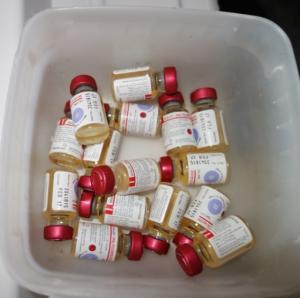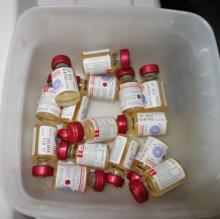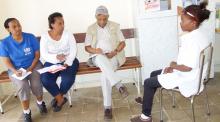Eritrea observes the African Vaccination Week and successfully implements the tOPV-bOPV switch
The African vaccine week in Eritrea was observed from 25-30 April, 2016 at national level in all zobas focusing more on polio eradication endgame and the importance of quality of vaccination. The service provided was to strengthen the routine immunization programmes in the country by increasing public awareness on the importance of every person’s right to be protected from vaccine-preventable diseases at set times and schedules. Its purpose was to keep immunization coverage high and sustained at national and sub-national levels through advocacy, social mobilization activities and improved access and utilization of the available services.
For the African Vaccination Week 2016, the Ministry developed key health messages on vaccination in the nine ethnic group languages in the country in CD form accompanied with description, photo show and short drama. These were disseminated for 5 days using various media out lets such as TV and Radio spots in collaboration with the Ministry of Information. Sensitization of care givers and mothers on the importance of timely completion of the vaccination schedule in order to have timely and fully immunized children was done. Although there is high immunization coverage in the country, there are problems with timely uptake of the vaccine doses and awareness of when caretakers return for the next dose. Thus the main focus of messages were mainly to address these two aspects.
At the same time, April, 2016 was the switch month for 156 countries which had been providing tOPV in their routine immunization program. Specifically, 17-30 April 2016 was a window period for countries to determine the national switch date, a date where tOPV is phased out and replaced with bOPV in the routine immunization program. The National switch date of Eritrea was fixed for the 28th April, 2016. All tOPV were withdrawn from health facilities and cold chain storage at all levels and bOPV was provided to children on the same date to fulfill one of the global requirements and strategies for polio eradication.
Moreover, before the switch date, a two days training and orientation was given to all the EPI focal person and health facility heads at sub-national level for participants from each health facility at zoba level. Aligned to these activities, sensitization and debriefing was made on the Global Polio Eradication Initiative’s Polio Eradication & Endgame Strategic Plan of 2013-2018, strengthening of AFP surveillance activities for possible wild polio importation and cVDPV type2.
A joint validation team of WHO and UNICEF verified the implementation of the tOPV – bOPV switch. This was conducted from 11 to 19 May 2016 in the five regions of Eritrea and nationally.
The Regional Switch committee was notified officially beforehand regarding the planned implementation of the switch. Training was provided to switch implementers and monitors two to three weeks before the implementation period. At least one or two staff from each facility participated in the training. In all service delivery points and vaccine stores visited, the team found that the staff were well aware of the switch implementation and the overall polio endgame strategic plan and the need to withdraw and discard the trivalent oral polio vaccine (tOPV) safely as per schedule.
Each facility was provided with a certificate of destruction after recording the number of vials to be collected. Furthermore, appropriately labeled bags were distributed to all health facilities and vaccine stores for the collection of tOPV that was being replaced.
A monitoring plan was developed prior the Switch with the sub-regional level responsible to visit the facilities in their catchment areas to collect the unused tOPV and check the proper withdrawal of tOPV from both in- and out- of the cold chain.
During the validation process, 100% of the National store, 83% of regional vaccine stores and 24% of sub-regional vaccine stores were visited. The team validated that tOPV vaccine was withdrawn from the cold chain and replaced by the bivalent oral polio vaccine (bOPV) on the switch date of 28th April 2016 from all service delivery points and presented certificate of destruction. 100% of the visited vaccines stores and service points have bOPV in the cold chain without a single dose of tOPV.
All the withdrawn tOPV were collected at the Regional level properly packed in label bags awaiting disposal. Due to lack of appropriate incineration facility and fuel, some Zobas (Maakel, Debub and Gash Barka) will send the withdrawn vaccines to Asmara in the last week of May. Anseba and Northern Red Sea Zobas have incinerated the collected tOPV vaccines after the validation visit.
During the monitoring in the validation process, the following health facilities were visited.
|
Anseba Region |
Gash Barka Region |
Debub |
Northern Red Sea Region |
|
Atekelezan |
Aqordat |
Segeneyti |
Ghindae |
|
Elabered |
Tesseney MCH |
Hadida |
Hirgigo |
|
Halib-Mentel |
Telata Asher |
Dekemhare |
Amatere |
|
keren |
Fanko |
Mai-Edaga |
Massawa |
|
Joko |
Eaynji |
Senafe |
Serejeka |
|
Barentu |
Adi-Keih |
Villajio |
|
|
Mogolo |
Embaderho |
||
|
Weki |
|||
|
Nefacit |
This was about 10% of the total service delivery points. Bivalent OPV was available in all the service delivery points visited, 1541 vials of tOPV had been withdrawn. All those tOPV vials collected had a label of “DO NOT USE”.






